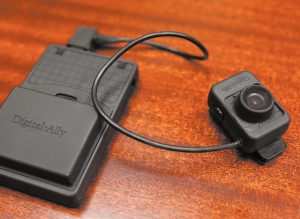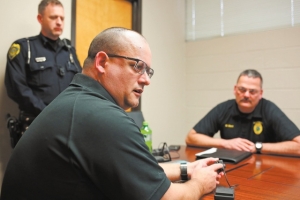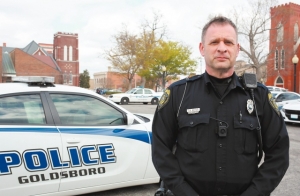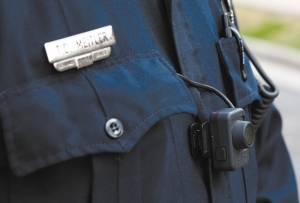Goldsboro police seek grant money for body cams
By Rochelle Moore
Published in News on March 8, 2018 9:30 PM

News-Argus/SETH COMBS
Pictured is the current body camera, made by Digital Ally, worn by officers at the Goldsboro Police Department.

News-Argus/CASEY MOZINGO
Capt. Karl Rabun talks about the current body cameras used by some of the officers at the Goldsboro Police Department on Wednesday.

News-Argus/CASEY MOZINGO
Officer Thomas Meitler wears one of the current body cameras that were purchased by the Goldsboro Police Department in 2017 in the middle of his torso where it is most secure and able to record an unobstructed view of what he encounters on scene. Currently the department does not own enough cameras for each officer, but hopes that a grant from the Governor's Crime Commission will help purchase close to 100 cameras.

News-Argus/CASEY MOZINGO
Pictured is the current body camera, made by Digital Ally, worn by officers at the Goldsboro Police Department. Officer Thomas Meitler wears his in the middle of his torso where it is the most secure.
Goldsboro police have been suited up with body cameras for the past year, but efforts are underway to potentially offer cameras to every officer.
The Goldsboro Police Department has applied for a $178,276 N.C. Governor's Crime Commission grant, which requires an $89,138 city match, for 96 Getac body-worn cameras, docking stations, chargers, trigger boxes for vehicles and storage servers.
The grant, if awarded, would allow every officer to receive his or her own camera, as opposed to the 35 cameras now being used by the force. The department, at full capacity, has 110 sworn officers, West said.
"My thought is, it's always better to try to equip all the officers with their own body cameras that they're responsible for," said Police Chief Mike West.
West prefers officers to have their own cameras, since sharing can lead to more damage and decrease the life of the camera. Sharing cameras can also lead to an officer not having one when needed.
Goldsboro police added the technology in 2017, following a national trend to increase protection for the public, as well as officers.
Law enforcement agencies across the nation have started recording police interactions after some police-involved shootings sparked protests and more calls for accountability.
In Goldsboro, officers recognized body cameras as an extra level of protection, West said.
"The public wanted officers to have body cams, and we've never been opposed to the body cam," West said. "I think it protects the public and the officer.
"Cameras have never been an issue for us. The biggest issue for us with cameras is getting funding."
The department's 35 cameras were purchased with a federal grant. At any given time, five are out of service for repairs.
The new body-worn cameras require an estimated $13,700 annual cost for maintenance. The purchase includes full replacement of all cameras after two years, West said.
The Getac technology will offer better security when officers upload videos to storage, the cameras have longer battery capacity and are able to be turned on automatically. Officers currently turn on their cameras by hand.
So far, body camera video footage has helped the department following public complaints about an officer, West said.
"We have, on a couple occasions, that I'm aware of," West said. "If we've got a citizen complaint about a call, an officer's attitude or whatnot and if the officer has a body cam, we'll look at the footage and the video.
"That's another issue where I think everybody needs a body camera."
Video footage is primarily being requested as part of court case files, said Capt. Karl Rabun.
The department's policy regarding body cameras is currently under review, since some people have asked that the cameras be turned off, West said.
"There's still things that we're working through," West said. "That's what we're working through, with policies, with the city attorney and looking at General Statutes, and what we can and can't do."
Body-worn cameras are used by officers during every call for service, West said.
Police officer Thomas Meitler said he hasn't had anyone ask that the camera be turned off. The greatest advantage is the cameras are viewed as more of a deterrent during police interactions with the public.
"I go to many domestics -- a lot -- and nobody yet has said, 'Turn that off,'" Meitler said. "For a majority of the public, when I do go out there and I have this turned on, I think its a deterrent."
In 2016, former Gov. Pat McCrory signed into law legislation that shields body camera footage from public review. Police departments have full discretion in deciding who can see the footage.
In Goldsboro, West reviews and decides on requests to review body camera footage. The department's policy requires that the request must come from the person in the video. If the video is part of a court case, the request will need to be channeled through an attorney.
Under state law, which went into effect in October, the video recordings are considered investigative materials and not a public record. �
